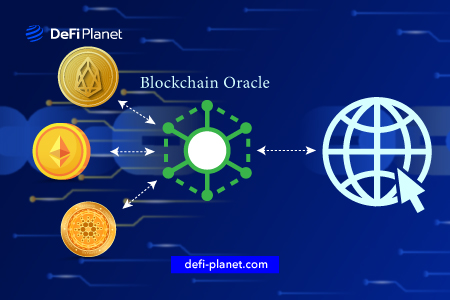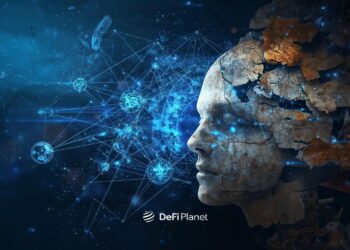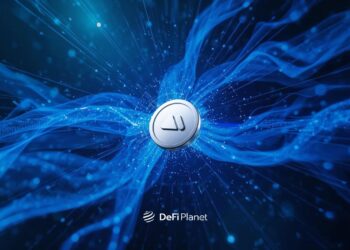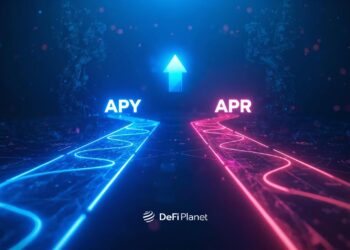Interconnectivity and communication are important in blockchain-based platforms. In the context of a blockchain, an oracle is a trusted third party that provides information about the state of the blockchain. Most crypto-related projects require access to data from reliable sources to function. Decentralized finance platforms are designed to operate with the aid of real-time information from reliable sources. The same can be said for some non-fungible token projects and other blockchain-based platforms.
For example, an automated market maker may depend on an oracle to access the prices of different tokens on several exchanges, allowing it to decide on the appropriate price based on its algorithm. This article comprehensively analyzes the complexities of a blockchain oracle system.
What is a Blockchain Oracle?
A blockchain oracle is an independent third-party platform that connects a blockchain ecosystem to both on-chain and off-chain data sources. Smart contracts would struggle to operate in the absence of blockchain oracles because they would lack the requisite data. Typically, the tenets of a smart contract are activated when particular conditions in the data set are transmitted.
The blockchain oracle’s function is to query, verify, and validate information before transferring it to the recipient. Oracle-powered platforms typically query a wide range of data sets, including price details, weather forecasts, and much more.
Smart contracts would struggle to operate in the absence of blockchain oracles because they would lack the requisite data. Typically, the tenets of a smart contract are activated when particular conditions in the data set are transmitted.
The blockchain oracle’s function is to query, verify, and validate information before transferring it to the recipient. Oracle-powered platforms typically query a wide range of data sets, including price details, weather forecasts, and much more.
Why Are Blockchain Oracles Important?
The concept of a blockchain oracle was created because blockchains are isolated.
Different blockchains are designed to operate independently of one another, making interoperability difficult.
A platform on Ethereum may require data from Binance Smart Chain at times, and obtaining this data without the use of an oracle layer is challenging.
Second, oracles were developed because blockchains could not access data from off-chain sources. To function efficiently, smart contracts require either off-chain or on-chain data sources.
An oracle serves as a link between the information sought by a crypto platform and the source of the data.
What Are The Use Cases of Blockchain Oracles?
Blockchain oracles are used in different capacities in the blockchain ecosystem because of their ability to query, validate, and transmit accurate data from multiple sources.
Futures
Futures have been around in the traditional finance industry for a while, but they have now made their way into the crypto market. They are a type of financial instrument used to hedge risks by enabling a trader to buy or sell an asset at a specific price and time in the future. Some decentralized finance protocols include futures options such as eternal contracts. Oracle price data is used by platforms that offer futures.
Decentralized Finance (DeFi)
The Decentralized Finance space has multiple features that attract users. DeFi eliminates the obstacles associated with traditional finance, which revolves around a difficult means of entry.
DeFi platforms offer a wide range of solutions that depend on data for several reasons.
Many of them must rely on oracles to run their businesses. One example is a decentralized exchange.
Insurance Protocols
Several crypto platforms rely on insurance protocols to mitigate risk. Some also have coverage against smart contract risks, wallet issues, and much more. The structure of the insurance platform determines when a payout is made. Typically, insurance platforms employ oracles to determine whether an event has occurred to trigger a payout.
The NFT Ecosystem
Oracles aren’t just for DeFi Protocols; they also have some applications in the NFT space. An oracle could be used by an NFT gaming platform to introduce a new feature that benefits players.
An oracle can be used by a Play-to-Earn platform to include a random NFT or loot box.
Let’s say an NFT project is looking for a way to pick a group of lucky winners at random from those who took part in an NFT drop. They can make use of a blockchain oracle for this. As new blockchain-based platforms emerge, the use cases for a blockchain oracle are increasing.
What Are The Different Types of Blockchain Oracles?
Blockchain oracles are available in multiple formats to serve numerous objectives or perform in various capacities.
Some Oracle platforms provide several of the following, while others may only offer one.
Human Oracles
Highly specialized professionals can operate as oracles by researching various queries, gathering information, validating it, and transmitting it to the smart contract.
This type of blockchain oracle is knowledgeable and can detect whether a hacker is attempting to feed the smart contract incorrect information or when a piece of data from a source is inaccurate.
This type of oracle is effective to some extent due to its knowledge and reputation.
Decentralized Oracle
The concept of a decentralized oracle system developed as a result of the risk of a single point of failure. There is no single entity in charge of its operations, and data is queried, verified, and transmitted by multiple parties. Multiple oracles collaborate in a decentralized oracle, and when an oracle is compromised, it is retired.
Centralized Oracle
A centralized oracle is a system that is controlled by a single authority, and everything that happens is dependent on that entity.
They are in charge of gathering information, validating it, and transmitting it. In this oracle mechanism, the risk of a single point of failure is high.
Customized Oracles
Some decentralized finance oracles customize their oracle systems so that only their smart contracts make use of the oracle.
In this case, the DeFi protocol may agree with an oracle platform to construct an oracle system that matches their requirements and can only be used by the DeFi protocol.
Choosing this option is far more expensive than utilizing a standard oracle mechanism.
Inbound Oracles
This type of oracle connects the smart contract to the platform’s outside world to receive data from outside sources and transmit it to the smart contract. An inbound oracle can be used by a platform that requires data from outside its ecosystem.
Outbound Oracles
Oracles that send data outbound from the platform to external recipients are known as “outbound oracles.”
Outbound oracles are used by protocols to connect to other protocols via information transmission.
What Are Popular Examples of Blockchain Oracle Platforms?
There are different examples of blockchain oracles, each with its own set of features. As always, it is important to conduct due diligence before using their services. ChainLink, Provable, Paralink, Witnet, and Dos.Network are some popular examples.
What Are the Risks Attached to Blockchain Oracles?
Though blockchain oracles are revolutionary, they have a fundamental limitation: they can be compromised. By transmitting inaccurate information to a crypto platform, hackers can exploit the vulnerabilities. Once it is compromised, the smart contract that relies on it suffers as well.
Assuming a smart contract operates by utilizing pricing information from an oracle and data from on-chain sources, a hacker could intercept the data before it reaches the smart contract and tamper with it, causing the system to perform erroneously. The hacker may be able to gain access to funds as a result of this action.
Blockchain oracles are typically not included in the security architecture of a platform.
They are designed and managed by third parties. This means that a crypto platform cannot control or tamper with the security structure of the oracle. They must hope that the blockchain oracle system is not adversely affected.
Aside from hackers obtaining access to the data feed, the platform that manages the data feed may upload inaccurate data, fooling the oracle into believing it is accurate. The oracle may inadvertently obtain data from inaccurate sources.
In Conclusion,
- Blockchain oracles are crucial to the operation of many smart contracts.
- They connect smart contracts to the requisite data.
- They differ in type depending on the platform’s goal.
- Protocols can customize their blockchain oracles.
- Some blockchain oracles focus on moving information into a platform, while others focus on moving information outward.
- Sometimes, a blockchain oracle may be a human being.
- There is a risk that the blockchain oracle may transmit inaccurate information to users.
- The need for blockchain oracles cuts across DeFi, NFT, and other blockchain-based platforms.
- While opting for a blockchain oracle, ensure to conduct due diligence.
If you would like to read more news articles like this, visit DeFi Planet and follow us on Twitter, LinkedIn, Facebook, and Instagram.





















